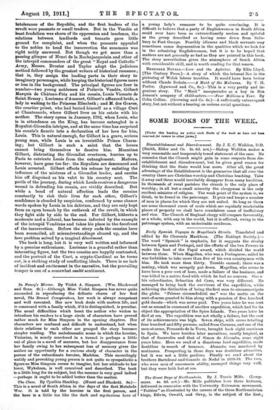Early Spanish Voyages to Magellan's Straits. Translated and edited by
Sir Clements Markham. (The Hakluyt Society.)— The word " Spanish " is emphatic, for it suggests the rivalry between Spain and Portugal, and the efforts of the two Powers to make the best of the Papal award, which divided the world between them. When Magellan, who was a Portuguese, sailed he was forbidden to take more than five of his own countrymen with him. He took more than thirty. Trouble ensued ; there was a mutiny, which was savagely put down. Magellan, who seems to have been a poor sort of hero, made a failure of the business, and was killed in a native feud with which he had no concern. One o his subordinates, Sebastian del Cane, was very different. He managed to bring back the survivors of the expedition, while achieving the distinction of being the first man to circumnavigate the globe. "Primus circumdedisti me" was the motto on the coat-of-arms granted to him along with a pension of five hundred gold ducats—which was never paid. Two years later he was sent out as second in command of another expedition, which had for its object the appropriation of the Spice Islands. Two years later he died at sea. The expedition was not wholly a failure, but the cost of its achievements was high. Seven ships, with crews totalling four hundred and fifty persons, sailed from Comma, and one of the men-at-arms, Fernando de la Torre, brought back eight survivors to Spain. We have besides later narratives, mostly tragical, as that of Saravedra and that of Simon de Aleazaba, some eight years later. Here we read of a disastrous land expedition, made doubtless in search of treasure. Aleazaba was murdered by
mutineers. Prospecting in those days was doubtless attractive, but it was not a little perilous. Finally we real about the brothers Bartolome and Gonzalo de Nodal in 1618-19. The two, who were men of uncommon ability, managed things very well, but they were both lost at sea.


































 Previous page
Previous page